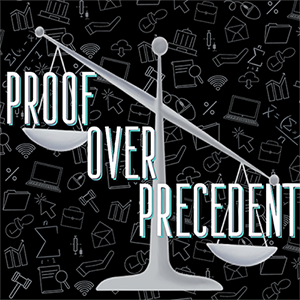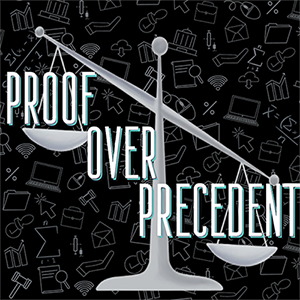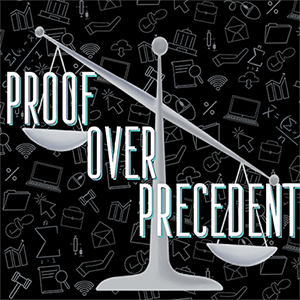Episode Transcript
[00:00:00] Speaker A: Imagine a justice system built on rigorous evidence, not gut instincts or educated guesses about what works and what doesn't.
More people could access the civil justice they deserve.
The criminal justice system could be smaller, more effective, and more humane.
The Access to Justice Lab here at Harvard Law School is producing that needed evidence. And this podcast is about the challenge of transforming law into an evidence based field.
I'm your host, Jim Griner, and this is Proof Over Precedent.
[00:00:34] Speaker B: Hi everyone, thanks for tuning in. My name is Andrew, and today we're going to be diving into a fascinating comparison between two ancient professions, medicine and law.
Specifically, we're going to be exploring how law might benefit from following medicine's path toward becoming a more data driven and evidence based profession.
Now, for centuries, both medicine and law operated primarily based on traditions and anecdotes and sort of popular wisdom.
But while medicine has transformed itself through empirical research and scientific methods, the legal profession remains largely stuck in its traditional ways.
So the question is, what can law learn from medicine's journey? And what might a data driven renaissance in the legal field look like?
Now, I want to start with a story.
Imagine the year is 1747 and a Scottish physician named James Lind is aboard the HMS Salisbury, a Royal Navy ship where scurvy is ravaging the crew.
Scurvy at the time was the bane of maritime voyagers. It was a mysterious disease that killed countless sailors throughout history.
At one point in time, theories about what caused scurvy were completely ridiculous.
Some people blamed salted meat. Other people pointed to homesickness.
Some people blamed copper pans.
Ironically, one of the theories held that too much fruit was actually the culprit.
By the mid-1700s, believe it or not, the prevailing wisdom was that something called bad air caused scurvy. Now, I'm not totally sure what bad air actually meant. I'm not sure anyone really is. But what I think it meant was just sort of recognition of the damp and frankly, gross conditions that sailors had to deal with on ships.
That being said, James Lind wasn't just content to accept these hypothesis. James Lynn decided to put those theories to the test.
He selected 12 sailors suffering from scurvy and divided them into six groups of two. Each of those groups received a different treatment.
One group received cider, Another group received vinegar, another seawater, and so on. But the final group received citrus. They received oranges and lemons, and the results were remarkable. Within a week, the only sailors who had any relief were the ones who had eaten the citrus. The others had shown basically no improvement without even Realizing it, James Lind had conducted what many consider to be the first controlled trial in medical history.
Some people even argue that it was the first randomized controlled trial, although experts debate whether Lind actually randomized who received what diet. Either way, though, his experiment marked a pivotal point in medicine's evolution from a field of exotic remedies and superstitions to the relatively evidence based discipline that we know today. The legal profession, by contrast, has not experienced a similar transformation. It's still operating in what we might call its own bad air phase.
Where medicine has evidence, the legal field by and large has anecdotes. Where medicine has science, law has intuition and precedent.
But it doesn't have to be that way.
There's nothing that's so unique about the practice of law that makes it immune to data and empirical analysis. That's my claim anyway.
And I would argue that law could and should benefit from the same kind of data driven renaissance that transformed the medical field.
And to understand how that might work, I think we need to understand the path that medicine took.
In the earliest days of medicine, physicians relied on ancient texts by figures like Hippocrates and Galen.
And for the most part, a doctor's credibility depended on his mastery of these theories and his ability to perform traditional procedures, many of which we now know were harmful and to us seem completely absurd. Like bloodletting, for instance, or trepanation, which was the practice of drilling holes into people's skulls.
It wasn't until the 1500s, more than a thousand years after Hippocrates and Galen, that those ancient theories faced any real scrutiny.
And when they did, their theories completely fell apart.
At that time, though, rather than embracing evidence, the medical field simply replaced old traditions with newer ones, still without any empirical basis.
But during the 1800s, the medical profession reached a turning point.
And that happened when a small group of reformers in the United States and the United Kingdom established medical journals like the New England Journal of Medicine in 1812 and the Lancet in 1823.
For the first time, contemporary research could be shared, debated and built upon. But even then, the statistical methods that are so characteristic of the medical profession today were completely absent, partly because the field of statistics itself was still in its infancy. It wasn't until the 20th century that statisticians like R.A. fisher and Jersey Naiman developed the methods that could be used to rigorously evaluate scientific conclusions.
Now, once those tools were created, fields like genetics and economics and physics and medicine, they incorporated those new forms of statistics, known as inferential statistics, into their research and their Medical practices.
So in 1948, for example, the British Medical Journal published results from the very first field randomized controlled trial, which was a study showing that streptomycin was an effective treatment for tuberculosis.
Now from there, medicine's path has remained, generally speaking, upward toward increased uses of statistics.
By 1968, for example, the director of the National Heart Institute quipped that medicine had given way to the, quote, benevolent tyranny of statisticians and their twin watchdogs, alpha and beta.
Now, where does all of this leave the law?
So where does all of this leave the law?
Well, it seems like as medicine has evolved into a science based discipline with rigorous empirical standards, law still operates based on precedent, rhetoric and theory that really isn't tethered to any sort of empirical reality.
And so what I'm arguing is that if the legal field wants to undergo a similar transformation, which I think it should, it would do well to follow medicine's example. And so I think the law can learn at least three key lessons from medicine's journey. The first lesson is that tradition and experience are not substitutes for hard evidence. I think that the fundamental lesson from the data renaissance within the medicine is that tradition and anecdotes can be dangerously misleading.
Over reliance on traditional wisdom led doctors to follow the theories of Hippocrates and Galen for centuries, even when those theories proved to be harmful in practice.
It really shouldn't have taken thousands of years to realize that draining someone's blood or drilling holes in their head was not helpful. But physicians kept doing it because that's what they were taught. That being said, when faced with contrary evidence, medicine eventually replaced expertise and anecdotes with hard data.
To some extent, the legal system is inherently built upon appeals to authority.
Citing supreme court precedent is just good lawyering, even if that precedent happens to be wrong.
But there are many other aspects of law that are tethered only to historical practice that don't really need to be so. Think about eyewitness testimony, for example. We just know how unreliable it is. That has been proven over and over and over again.
And yet we still rely on it, maybe more than anything when it comes to criminal trials. Or consider how slowly courts have adopted technology that could improve access to justice.
While medicine has largely undergone a digital transformation, many courts still operate with paper filings and mandatory in person appearances.
Medicine has built a culture of evidence based practice and continuous improvement.
And unfortunately, the law is stubbornly attached to the past.
The second lesson the law can learn from medicine is that habits form early medical education Transformed in the 1990s with the introduction of evidence based medicine curricula.
Now, that change came in response to the growing body of research that had accumulated, but that physicians didn't really know how to use.
Today, medical students not only learn about anatomy and pharmacology, but they also learn how to formulate research questions, how to search medical literature for relevant data, how to apply their findings to patient care.
They're taught to evaluate evidence scientifically rather than blindly following tradition or even blindly following the newest research.
Legal education, by contrast, has remained largely unchanged science since the 1800s, when the dean of Harvard Law School introduced the case method.
There is no such thing as evidence based law in the same way that we have evidence based medicine.
But there should be.
Just as physicians ask themselves what does the data show before they treat a patient? Lawyers need to be asking themselves, what does the data show? Before advising their clients or advocating for some kind of systemic change.
The final lesson that law can learn from medicine is that data must be usable.
In the 1970s, a physician by the name of Archie Cochrane published an article lamenting the lack of a centralized database for medical research.
At that time, finding and synthesizing studies on a particular topic required combing through dozens of journals and sort of individually assessing methodologies and results.
Now, Archie Cochrane's idea led to the creation of what's called the Cochrane Collaboration, an organization which was established to collect and systematically review medical research to make scientific findings more accessible to practicing physicians.
If the law is going to have its own data driven renaissance, we need to have the infrastructure to do that. Just as there are systematic reviews of medical research, there should be systematic reviews of legal research that can help establish a standard of legal care among judges, lawmakers and practitioners, which would have the effect of making the entire system both more effective and more fair.
In closing, I want to say that although the path forward for law, I think is clear, it's certainly not without its challenges.
But just as medicine was able to move from a time period when doctors were drilling holes in people's heads to now, when we have stem cell research and we have cures for diseases that even 50 years ago would have been death sentences, I think that the legal profession has a good opportunity to have a revolution of its own. The legal field needs someone like James Lynd, and it needs journals like the New England Journal of Medicine and the Lancet to break through conventional wisdom and help us adopt a more evidence based culture.
Obviously, this transformation won't happen overnight. In the medical context, it took centuries. But the potential rewards here are substantial. We could have a more efficient, a more effective and a more accessible legal system for everybody. And we could do that by learning a thing or two from the history of medicine.
Once again, my name is Andrew and and thanks for listening.
[00:15:03] Speaker A: Proof Over Precedent is a production of the Access to Justice Lab at Harvard Law School.
Views expressed in student podcasts are not necessarily those of the A J Lab.
Thanks for listening. If we piqued your interest, please subscribe wherever you get your podcasts. Even better, leave us a rating or share an episode with a friend or on social media.
Here's a sneak preview of what we'll bring you next week.
[00:15:28] Speaker C: In this study, we're really focusing on legal literacy, I guess is what is how we've phrased this term. If people knew about their rights as tenants and about resources that were available in the community to help them when their housing insecure, would they take up those resources and use that information to avoid evictions and.
 Image by Courtney Chrystal, J.D. candidate, Harvard Law School
Image by Courtney Chrystal, J.D. candidate, Harvard Law School


